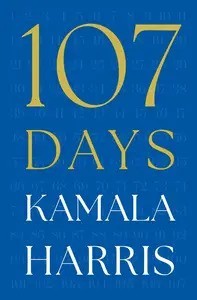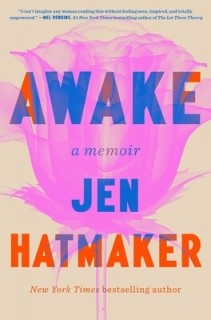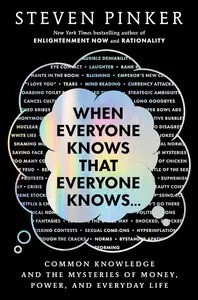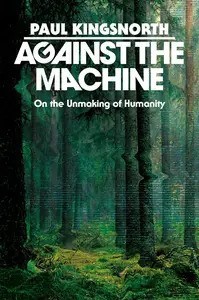The NYT Best Sellers - 12 October 2025 (Nonfiction)
The NYT Best Sellers - 12 October 2025 (Nonfiction)
01. 107 DAYS by Kamala Harris
02. POEMS & PRAYERS by Matthew McConaughey
03. AWAKE by Jen Hatmak
04. CONFRONTING EVIL by Bill O'Reilly
05. SOFTLY, AS I LEAVE YOU by Priscilla Beaulieu Presley
06. ALL THE WAY TO THE RIVER by Elizabeth Gilbert
07. THE BOOK OF SHEEN by Charlie Sheen
08. THE ANXIOUS GENERATION by Jonathan Haidt
09. THE BODY KEEPS THE SCORE by Bessel van der Kolk
10. BLACK AF HISTORY by Michael Harriot
11. HISTORY MATTERS by David McCullough
12. THE MAGA DOCTRINE by Charlie Kirk
13. WHEN EVERYONE KNOWS THAT EVERYONE KNOWS by Steven Pinker
14. TIME FOR A TURNING POINT by Charlie Kirk
15. AGAINST THE MACHINE by Paul Kingsnorth
New this week:

01. 107 DAYS by Kamala Harris
107 Days is a candid political memoir chronicling Kamala Harris's 2024 presidential campaign—the shortest in modern history—beginning with Joe Biden's July 21 withdrawal and ending with the November 5 election, offering an intimate, novelistic view of the frenetic 107 days filled with strategic decisions, debate preparations, running mate selection, and reflections on her loss to Donald Trump. Harris details her anger over Biden's debate performance and the White House's handling of her office, critiques party dynamics including criticisms of figures like Josh Shapiro and Gavin Newsom, compares her narrow defeats in key states to a Super Bowl upset, and explores themes of resilience, self-reflection, and future political possibilities without confirming a 2028 run, while emphasizing lessons on democracy, media, and moving forward amid grievances and mutual respect with Biden.

03. AWAKE by Jen Hatmak
Awake is a raw, candid memoir chronicling Jen Hatmaker's midlife upheaval, beginning with the shocking discovery of her husband's infidelity after 26 years of marriage on July 11, 2020, which led to divorce, single parenting five children, and a profound unraveling of her evangelical identity and cultural systems.

05. SOFTLY, AS I LEAVE YOU by Priscilla Beaulieu Presley
Softly, As I Leave You is a deeply personal memoir detailing Priscilla Presley's life after her 1973 divorce from Elvis Presley, exploring the glamour and isolation of their marriage, the challenges of reinvention as a single mother to daughter Lisa Marie, and her evolution into a businesswoman, actress, designer, and advocate who transformed Graceland into a global landmark. Despite the separation, their enduring love persisted until Elvis's 1977 death, which shattered her anew, compounded by later losses including Lisa Marie's 2023 passing and other family tragedies, while she navigated grief, motherhood, and public scrutiny with quiet dignity and resilience.

13. WHEN EVERYONE KNOWS THAT EVERYONE KNOWS by Steven Pinker
When Everyone Knows That Everyone Knows... explores the concept of common knowledge—where everyone knows something, knows that others know it, and so on infinitely—as a fundamental driver of human social dynamics, explaining paradoxes in behavior from awkward first dates and social media shaming to financial bubbles, revolutions, and diplomatic pretenses. Drawing on research from psychology, economics, game theory, and linguistics, Steven Pinker argues that public events generate this layered awareness, enabling coordination but also motivating avoidance through euphemisms, hypocrisy, and innuendo to preserve relationships or power structures. The book reveals how common knowledge underpins harmony in cooperation, hypocrisy in veiled communication, and outrage in collective actions, offering insights into why people pretend not to see the elephant in the room and how this shapes politics, markets, and everyday interactions.

15. AGAINST THE MACHINE by Paul Kingsnorth
Against the Machine is a prophetic critique of techno-capitalism's dehumanizing effects, tracing the Machine's evolution from the Industrial Revolution to AI, which has uprooted humanity from nature, culture, and spirituality, replacing sacred order with science, self, sex, and screens while fostering spiritual exhaustion and environmental destruction. Paul Kingsnorth argues that this system enforces hypocrisy and alienation, urging resistance through suspicion of power, reconnection to land and heritage, and ascetic self-denial to reclaim the "Four Ps" (past, people, place, prayer) against modernity's "Four Ss," offering a spiritual manual for dissidents seeking restoration amid the Antichrist-like encroachment of technology.